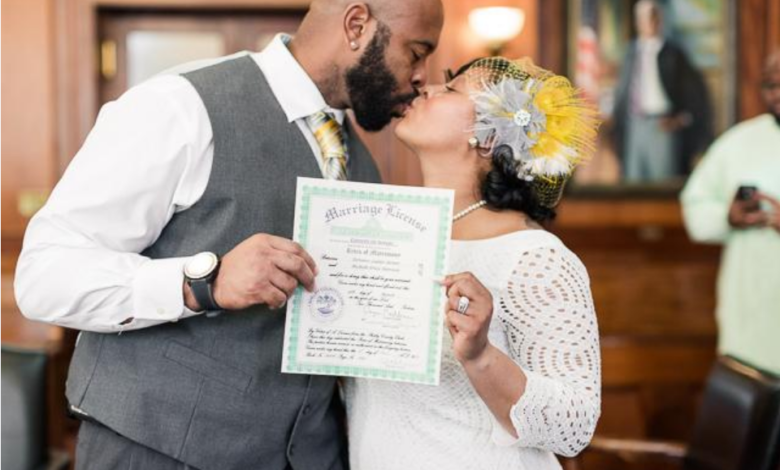Steps and Procedures of Court Weddings in Nigeria

Steps and Procedures of Court Weddings in Nigeria
Wedding ceremony is an important event in a person’s life. It is a ceremony done specially to join a man and woman legally as husband and wife. Wedding ceremonies have a long history and can be said to be as old as man. Since the ceremony has been in existence for quite a long time now, it cones in different forms according to beliefs, customs and traditions; the most common being; church wedding, Islamic wedding, traditional wedding and court wedding. It is a must for every couple to have either of the aforementioned wedding types before their marriage can be counted as valid.
One of the most loved wedding type is court wedding. It is a very simple type of wedding that involves the couple and just two people to stand as witnesses. It is very cheap and the couple also have the opportunity of having their marriage recognized by the federal government as it is governed by the 1914 marriage act. Females specially like this type of wedding because it is a one man-one wife type of marriage. Failure to comply with the rule attracts a penalty of five years imprisonment…………..Continue Reading
Steps and Procedures of Court Weddings in Nigeria
In Nigeria, there are two federal marriage registries. One is located in Lagos and covers for the southern part of the country, while the second is situated in Abuja. This one covers for the northern part of the country. Asides this two, there are several other registries located at the state, local government and LCDA level in different parts of the country.
Steps and Procedures of Court Weddings in Nigeria
Below are the steps and procedures of court weddings in Nigeria. So if you intend to have one, we recommend going through this article in order to learn what is involved in having a court wedding in Nigeria:
Step 1: Consent and Agreement Between the Intending Couples
Every court wedding is expected to be carried out by two consenting adults i.e. male and female who are up to the age of 21. If one or both couples are below 21, they are expected to present a letter of consent from the parents both agreeing to the marriage. The couple is also expected to be unrelated to each other by any means. And unlike the traditional wedding and church weddings that requires parental consent, the court wedding does not require parental consents.
Step 2: Visit any Marriage Registry Within Your Jurisdiction To Make Your Intention Known
Once you have concluded and had an agreement with your partner, you can then visit any marriage registry under your jurisdiction. You are also expected to take along two coloured passport sized photographs each.
On reaching the registry, you will be asked to fill a form known as form A or notice form. You will also be expected to submit the passport photographs together with the form. This form will then be pasted on the notice board at the marriage registry as a letter of marriage intention. It will also be entered into a marriage notice book which can be inspected by people during office hours without a fee.
If after 21 days of pasting the notice, no objection is made from any quarters against the marriage, then the couple would be allowed to proceed with the marriage procedures.
Step 3: Payment Of The Marriage Fees
Once the notice of marriage has exceeded the 21 days ultimatum and no objection is made, the couple can then pay the prescribed fees based on the type of marriage. Since it could be an ordinary marriage (between two Nigerians) or special marriage (between a Nigerian and a foreigner). This fee differs across marriage registry. The fees stand within an average of #15,000 to #50,000.
Once the payment is made, you will be issued another form known as form C after the below requirements have been met and satisfied by the marriage registrar who will also issue a signed declaYou to the couple.
- One of the parties is a resident within the district in which the marriage is intended to be celebrated.
- Each of the party to the intended marriage (not a widow or widower) is twenty one years old. If under the age, the consent of the party legal parent or guardian is obtained in a written form and annexed to an affidavit
- There must be no form of kinship, affinity or any other lawful hindrance to the marriage
- Neither of the party to the intended marriage must be married by customary law to any person other than the person with whom the marriage is proposed to be contracted.
Step 4: Swear An Affidavit
Once you’ve been issued a form C, you will be asked to swear an affidavit before the registrar or a recognized minister of religion. The registrar will then reiterate the requirement and explain the penalties involved. The affidavit is usually a declaration of bachelorhood for the man and spinsterhood for the woman. Violation of any of the rule can lead to prosecution and subsequent sentence to 2 years jail term. Once the requirements have been satisfied, the registrar would then sign a declaration/affidavit.
Step 5: Issuing Of Certificate
After the affidavit has been sworn, the registrar or marriage minister would then issue another form known as form D to the couple. The form authorizes the celebration of a marriage between the couple. After the issuance of the certificate, a date is which is within three months of the issuing of the certificate is then chosen by the couple. This date is also the date for the wedding proper.
Step 6: Wedding Proper
After all the formalities has been completed, the couple would then come along with their family members and friends to the court for the wedding. The couple is not expected to wear anything fancy, just an official or native wear is enough to get the ceremony done. The wedding usually does not last for more than 30 minutes. The couple would then be given a marriage certificate printed by the registrar in duplicates and counterfoils as in form E. This signifies the end of the wedding.
Marriage Registry Documents & Requirements in Nigeria
Below are the required marriage registry documents before your court wedding in Nigeria:
- Birth certificate or declaration of age
- Means of identification
- Passport photograph
- Certificate of state of origin (Nigerians only)
- Sworn Affidavit of Bachelorhood or spinsterhood from a law court (if bachelor or spinster)
- Affidavit of marriage (if married)
- Evidence of divorce (if divorced)
- Death certificate of previous husband or wife (if widowed)
- Evidence of annulment from court if the previous marriage was annulled
- Sworn affidavit of being a single with children
- Data page of international passport if living abroad
- Arrival passport stamp page if living abroad
- Residence permit if living abroad





